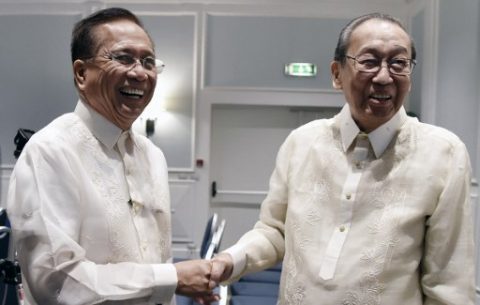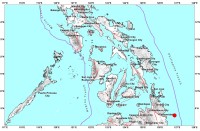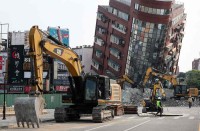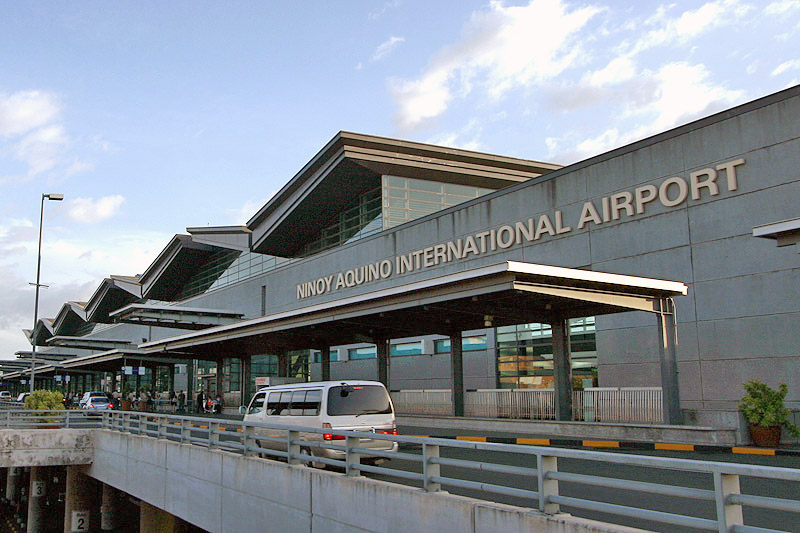
(Eagle News) — The Philippine government peace negotiators held their ground not to participate in the peace talks with the National Democratic Front of the Philippines (NDFP) after the communists’ order to the New People’s Army (NPA) rebels to intensify attacks on government forces after the martial law declaration of President Rodrigo Duterte.
Dureza and the head of the government negotiating panel, Labor Secretary Silvestre Bello III, announced Monday morning in Noordwijk aan Zee, Netherlands, the peace talks’ venue, that they were maintaining the decision not to participate in the fifth round of talks with the communist group, as they formally withdrew from the talks.
“We are maintaining the decision made not to participate in the fifth round of talks,” chief government negotiator Jesus Dureza told journalists after almost 10 hours of closed-door consultations.
“There are no compelling reasons for us to change the decision that had been arrived at, and which we announced yesterday,” he explained.
“What is clear is that while we are withdrawing from the fifth round of talks, we are not terminating the talks,” Bello clarified.
“This is a temporary setback which has also happened in the past. This only means we need to work harder on the peace process,” he said.
Dureza said that the May 27 decision not to participate in the fifth round of talks was because there was no “enabling environment conducive to peace negotiations.”
“As we always say and we will continue to say so: ‘The road to peace is not a well-paved road. It has humps and bumps along the way. But let’s all stay the course in this not-so easy road to peace in our land,'” he said in his earlier statement.
Dureza said the order to withdraw from the fifth round of talks with the NDFP came directly from President Rodrigo Duterte.
“Any decision we make here is, of course, vetted with the President,” he said.
Deep regret
NDFP negotiators said they “deeply regretted” the Philippine government’s decision to withdraw from the talks, even as they explained that they had already recommended to the Communist Party of the Philippines to reconsider their order to the NPA.
Chief rebel negotiator Fidel Agcaoili said the communist negotiators had “recommended to our leadership to reconsider the order, but that takes time”.
But they claimed the NPA operations cannot be attributed to the failure of the communist leaders to control their rebel forces on the ground.
“Contrary to the GRP allegations, the NPA operations cannot be attributed to the failure of the CPP-NPA-NDFP leadership to control their ground forces. Rather, they (CPP directives) are defensive and counter-offensive responses to the (Armed Forces of the Philippines) AFP provocative actions and offensive operations,” said the NDFP in a prepared statement.
He said the NDFP, a coalition of several groups of which the Communist Party of the Philippines (CPP) is among the most prominent, “deeply regretted” Manila’s decision to shelve the talks.
In a statement the NDFP lashed out at Dureza’s comments on the order, saying it “totally obscures the fact that the government has been waging an ‘all-out-war’ against” the New People’s Army (NPA), the CPP’s armed wing.
It added that Duterte’s declaration of martial law in southern Mindanao “is bound to further escalate the armed conflict, aggravate the human rights situation and exacerbate the suffering of the people”.
But they said that they are still open to continuing the peace talks.
Troubling communist actions cited
Dureza in an earlier statement said it was the CPP’s order to the NPA for intensified government attacks that was the most troubling for the government’s side.
“President Duterte has given the mandate and strategic directions where we all can possibly converge, taking unprecedented and even unconventional and never-done-before actions and decisions to seek peace,” he said in his statement.
He cited the President’s actions as the following:
a)” Engaging the CPP/NPA/NDF even before the assumption Into office of the president doing “back channeling”to re- start the long stalled and moribund peace talks;
b) inviting the outlawed CPP/NPA/NDF to nominate members of his cabinet;
c) in unprecedented moves, releasing prisoners facing criminal charges and others already convicted by our regular courts and those who are old and infirm and sick;
d) for a time, declaring a unilateral ceasefire and halting offensive operations against the NPAs;
e) personally welcoming and meeting several times with leaders of the CPP/NPA/NDF in Malacanan
f) despite the open and blatant attack of NPAs in the country and even in Davao city, the President’s own home turf, he directed the panel to keep the course of peace.”
Dureza said that the “the most serious development of late and which now puts in great jeopardy as to whether or not we can still keep the course of peace in this peace table is the blatant publicly announced decision of Communist Party of the Philippines, the political organ of our counterparts across the table who are here, ordering their forces on the ground to accelerate and intensify attacks against the government in the face of the declaration of martial law in Mindanao.”
He said martial law in Mindanao is “principally directed at extremists and terrorists who openly and defiantly challenged the government and put to harm the Filipino people triggered by the still-ongoing violent incident in the Islamic city of Marawi in Mindanao.”
“The government panel is now left without any other recourse but to announce, with due respects to our counterparts and to our facilitator, the Royal Norwegian government that it will not proceed to participate in the scheduled 5th rounds of peace negotiations until such time as there are clear indications that an enabling environment conducive to achieving just and sustainable peace in the land through peace negotiations across this table shall prevail,” the statement of the presidential peace adviser said.
Dureza then thanked the peace talks’ host, the government of Norway, for continuing to support the peace talks.
“We thank the Royal Norwegian Government which has so far steadfastly and fully supported our joint work for peace for so long. I trust it will understand why we at the Philippine Government side have arrived at this decision,” he said.
It was the fifth scheduled round of talks since the resumption of formal negotiations between Manila and the communists in August.
They were meant to address such issues as a joint interim ceasefire, social and economic reforms and human rights issues.
– ‘Just and sustainable peace’ –
The breakdown of the talks, held in a scenic Dutch seaside resort, came as fighting flared Sunday between Philippine government forces and Islamist militants in the south, with the death toll nearing 100 after almost a week of fighting.
But Dureza, who is also Duterte’s chief advisor, emphasized that the withdrawal from this round of talks was not a formal withdrawal from the peace process initiated in August 2016.
“The peace talks have not been cancelled and the peace process remains intact,” added Elisabeth Slattum, special envoy of Norway, which has been facilitating the peace talks.
(Eagle News Service, with a report from Agence France Presse)







